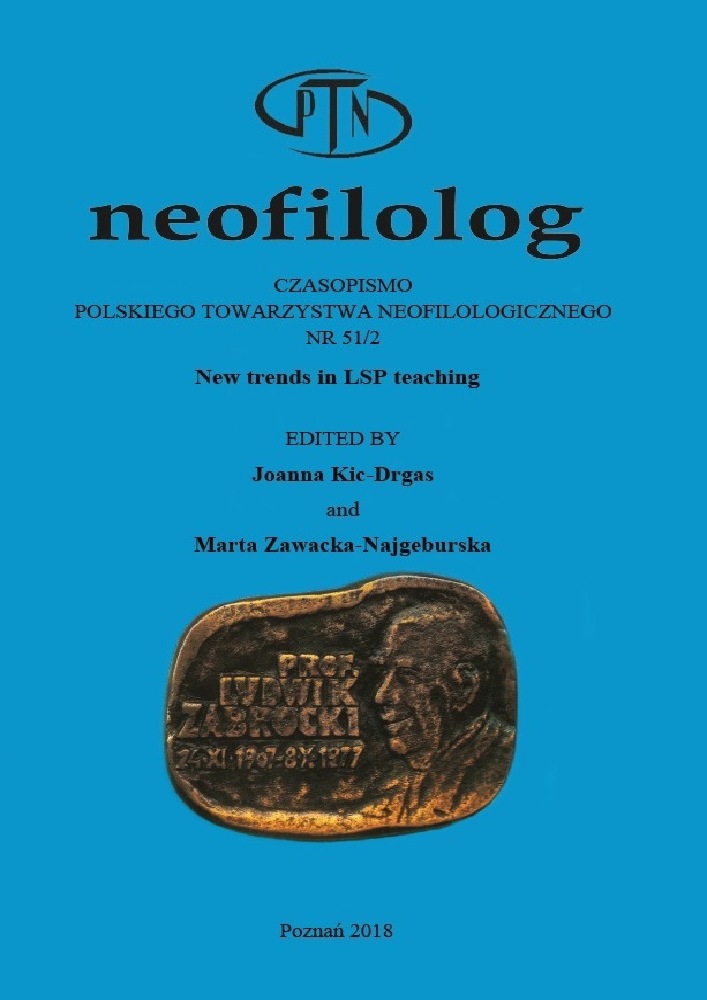Abstrakt
Within the field of Translation Studies, terminology plays an important role, as does the study of Terminology. This paper investigates the possibilities available within the constraints of a single course aiming to achieve multiple aims. A brief overview of how terminology is studied is followed by a presentation of the context, looking at the position of the course in relation to other courses in the same programme, and at the broader context of Translation Studies in Europe. The case study is of a Terminology course, as part of a post-graduate, two-semester, part-time programme in Translation, at Kodolányi János University of Applied Sciences in Hungary. The question of why terminology has a course to itself is likewise placed in the context of Terminology Studies and theoretical issues related to what terminology is. Finally, the course is also placed within the context of training students to become professionals in translation and related fields.
Bibliografia
Antia, B. E., Budin, G., Picht, H., Rogers, M., Schmitz, K.-D., Wright, S. E., Clas, A. (2005), Shaping translation: A view from terminology research (in) “Meta”, No 50(4).
Bennett, R. (2002), Employers' demands for personal transferable skills in graduates: A content analysis of 1000 job advertisements and an associated empirical study (in) “Journal of Vocational Education and Training”, No 54(4), 457-476, DOI: http://doi.org/10.1080/13636820200200209.
British Council/Think Global (2011), The global skills gap: Preparing young people for the new global economy. (London) https://think-global.org.uk/wp.content/uploads/dea/documents/BusinessPoll_online_TG.pdf.
Budin, G. (2001), A critical evaluation of the state-of-the-art of terminology theory. “ITTF Journal”, No 12(1–2), pp. 7–23.
Cabré s, M.T. (2003) Theories of terminology – Their description, prescription and explanation (in) “Terminology”, No 9(2), pp. 163–199. https://doi.org/10.1075/term.9.2.03cab.
Cabré, M.T. (1999), Terminology: Theory, Methods and Applications. Amsterdam/John Benjamins.
Chiocchetii, E., Ralli, N. (2009), Definition und Definierbarkeit des Rechtbegriffs in der Terminologie (in) VAKKI Symposium XXIX, “Language and power”, No 36. Vaasa: Unieristy of Vaasa, pp. 98-109. http://www.vakki.net/publications/2009/VAKKI2009_Chiocchetti&Ralli.pdf.
Diamond, A., Walkley, L., Forbes, P., Hughes, T., Sheen, J. (2011), Global graduates into global leaders. London: CIHE.
Faber Benítez, P. (2009), The cognitive shift in terminology and specialized translation. Universidad de Alicante: Servicio de Publicaciones.
Gambier, Y. (2013, June), Cartographie succincte des programmes de traduction. University of Turku, Finland. Paper presented at the Final Conference of OPTIMALE. University of Rennes.
Horbačauskienė Jolita. (2017), Translation studies: Translator training vs employers’ expectations (in) “Journal of Language and Cultural Education”, No 5(1), pp. 145-159 DOI: https://doi.org/10.1515/jolace-2017-0009.
Jones, E. (2013), Internationalization and employability: The role of intercultural experiences in the development of transferable skills (in) “Public Money and Management”, No 33(2), pp. 95-104.https://www.academia.edu/2489954/Internationalization_and_employability_the_role_of_intercultural_experiences_in_the_development_of_transferable_skills.
Kahneman, D. (2011), Thinking, fast and slow. London: Allen Lane.
Klaudy, K. (2003), Languages in translation: Lectures on the theory, teaching and practice of translation; with illustrations in English, French, German, Russian and Hungarian. Budapest: Scholastica.
Kramsch, C. (1998), Language and Culture. Oxford: Oxford University Press
Martínez, S.M., Faber, P. (2009), Terminological Competence (in) “Translation. Terminology” No 15(1), pp. 88-104. http://dx.doi.org/10.1075/term.15.1.05mon.
OPTIMALE Optimising Professional Translator Training in a Multilingual Europe (2012), Progress report: Public part. http://www.ressources.univ-rennes2.fr/service-relations-internationales/optimale/attachments/article/40/Public%20part_report_2010_OPTIMALE%204018-001-001.pdf
Pasin, D., Delgado, H., Fischer, V. (2015), Dealing with ambiguity: An analysis of Pym's recommendations to retrieve ambiguities of terms related to translation studies (in) “International Journal of Language and Linguistics”, No 2(8), pp. 33-40.
Peruzzo, K. (2013), Short-period evolution in EU legal texts: Old and new terms, old and new concepts (in) “Linguistica”, No 53(2), pp. 39-53. https://www.dlib.si/stream/URN:NBN:SI:DOC-9CYCYX1K/1b1afe78-1e98-4e88-95ee-3a1 8b75898eb/PDF.
POINTER (Proposals for an operational infrastructure for terminology in Europe) Final Report. (1997), http://www.computing.surrey.ac.uk/ai/pointer/report/
Pym, A. (2009), Translator Training. Pre-print text written for The Oxford Companion to Translation Studies. https://www.researchgate.net/publication/242711915_Translator_training.
Pym, A., Grin, F. Sfreddo, C., Chan, A.L.J. (2012, June), The Status of the Translation Profession in the European Union: (DGT/2011/TST): final report, 26 June 2012. Luxembourg: Publications Office of the European Union. https://ec.europa.eu/info/departments/translation.
Richter, B. (2008), Practical and Theoretical Elements of Translator Training in Hungary: A Case Study (in) “Studia universitas Babes-Bolyai philologia” No 53(3), pp. 67-80.
Robinson, D. (2003), Becoming a translator: An introduction to the theory and practice of translation. London: Routledge.
Temmerman, R. (2007), Approaches to terminology. Now that the dust has settled (in) Simonnæs, I. (ed.), SYNAPS 20. Bergen: NHH, pp. 27-36.
Temmerman, Rita (1997), Questioning the univocity ideal: The difference between socio-cognitive Terminology and traditional Terminology (in) “Hermes”, No 18, pp. 51–90. https://www.semanticscholar.org/paper/Rita-Temmerman-Questioning-the-univocity-ideal-.-Temmerman/e6312c9d1efeff3a609cd6819c52844d41f303e2.
Valero-Garcés, C. (2013, June), Mapping Translator Training in Europe. Presentation at the Final Conference of OPTIMALE at the University of Rennes.
Wüster, E. (1979), Einführung in die allgemeine Terminologielehre und terminologische Lexikographie. Teil 1-2. Springer-Verlag.
Licencja
Prawa autorskie (c) 2018 Borka Richter

Utwór dostępny jest na licencji Creative Commons Uznanie autorstwa – Bez utworów zależnych 4.0 Międzynarodowe.
Przedstawiany utwór (artykuł) upubliczniany jest na podstawie umowy z autorem i na licencji Creative Commons Attribution-NoDerivatives 4.0 International (CC BY-ND 4.0).
Użytkownicy mają obowiązek podania wraz z rozpowszechnionym utworem, informacji o autorstwie, tytule, źródle (odnośniki do oryginalnego utworu, DOI) oraz samej licencji;
- bez tworzenia utworów zależnych,
- utwór musi być zachowany w oryginalnej postaci.
Uniwersytet im. Adama Mickiewicza w Poznaniu zachowuje prawo do czasopisma jako całości (układ, forma graficzna, tytuł, projekt okładki, logo itp.).

